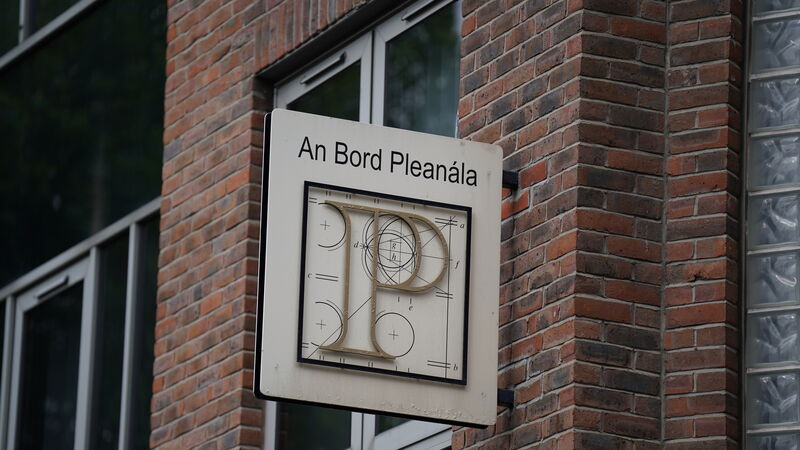An Bord Pleanála delays could invalidate applications for thousands of homes

Before Christmas, An Bord Pleanála had issued an apology as it said it was not meeting its statutory deadline in a “large number of cases”.
Planning applications for thousands of homes may be refused as ongoing delays at An Bord Pleanála could have rendered dozens of applications invalid.
In the case of three proposed developments encompassing over 1,000 new homes in Cork, applications submitted well before the city’s new development plan came into place may not proceed now due to a technicality that has been exacerbated by delays at the planning board.
This includes plans for 823 apartments at the former Tedcastles Yard on Centre Park Road, and developments of 280 and 140 apartments in Blackrock. The problem is more acute in Dublin, according to analysis by planning law solicitor Fred Logue, affecting permissions sought for well over 4,000 homes.
In all, there are 96 pending Strategic Housing Development (SHD) applications across the country, of which around half of them were submitted before their new development plans came into effect.
It comes as housebuilder Glenveagh revised down the number of suburban housing units it expects to deliver this year citing a "dysfunctional planning policy" as it awaits permission for 20% of the homes it plans to build.
"Addressing this significant undersupply continues to be obstructed by dysfunctional planning policy," Glenveagh CEO Stephen Garvey said. "We would now strongly encourage that planning policy reform is expedited to solve the longer-term structural supply issues the sector faces."
The system for SHDs – for planning applications of 100 or more homes – saw developers applying directly to An Bord Pleanála.
As part of this application, developers had to indicate how their proposals fit in with the local city or county’s development plan and, if necessary, point out how and why their proposals involve a material contravention of that development plan.
However, in recent months, local authorities across the country have been approving and bring into effect new development plans valid for the coming years meaning that planning applications caught in the massive backlog at An Bord Pleanála now address development plans that no longer apply.
Before Christmas, An Bord Pleanála had issued an apology as it said it was not meeting its statutory deadline in a “large number of cases”. It has repeatedly lost cases in the courts on appeals against decisions it has made regarding SHDs, and has also paid out over €1m to developers due to the late processing of applications for SHDs.
Mr Logue identified around two dozen cases where, if An Bord Pleanála had met its statutory deadline, then the planning application could’ve been decided upon before the area’s new development plan came into effect.
“With SHDs, there’s no procedure for the board to ask for revised reports,” he said. “It’s no longer the basis for an application. They’re supposed to be oven ready. That’s the reason for its pre-application consultation, all of that stuff should’ve been sorted out. Normally a planning authority would issue a request for further information, but that step is not present here.”
He said the problem will become acute in Fingal, with 21 applications encompassing thousands of homes still up for decision before its new development plan is due to take effect in April. The largest is a 2,527-home development proposed in Belcamp, Dublin 17.
In a statement, a spokesperson for the Department of Housing said that “decisions on SHD applications have to have regard to the local authority development plan that is in place on the date that the decision is made”.
The spokesperson added: “While the number of vacancies on the Board over recent months has caused some delays in the determination process in respect of some SHD applications, these vacancies are now in the process of being filled which will expedite decision-making.”
Meanwhile, An Bord Pleanála said that its consideration of any case has regard to the local authority development plan in force at the time of its decision, and to deal with matters on a case-by-case basis.
“This situation of application decisions crossing over development plan cycles for certain cases has been a long-standing feature of the planning system,” it said.
“The Board’s approach is to then deal with each case on its own merits on a case-by-case basis and in accordance with the relevant applicable statutory framework.” One such matter has already come before the courts.
Mr Justice David Holland, in his judgement on 20 December 2022, noted that “surprisingly, the question has never been explicitly decided which development plan applies in deciding a planning application where the development plan has been replaced while the planning permission application is pending”.
“I respectfully observe that my task could have been made a lot easier and this judgment a lot shorter had the legislation made specific provision for the inevitable reality of changing circumstances bearing on an SHD planning application,” he said.
Mr Holland said that “legislative assistance would be very welcome” should the problem arise in future which, going by the number of SHD applications still in the system, it may well do.
Mr Logue said that the present issue shows the “folly of rushed legislation”.
“No one ever thought about these things,” he said. “When the SHD system came in, it was mid-cycle for most development plans. All development plans were being revised then between the end of 2021 and the start of 2023.” In its statement,
An Bord Pleanála added: “While the Board can and does source and consider its own legal advice in respect of its decision-making functions (where it considers this necessary), it does not give general interpretations of the law.
“Having regard to the foregoing, and also to its quasi-judicial functions in considering and determining individual cases in any category, the board has no further comment.” The SHD system is being phased out to make way for the Government’s new Large-scale Residential Development system, where applications will return to the local authority in the first instance.













